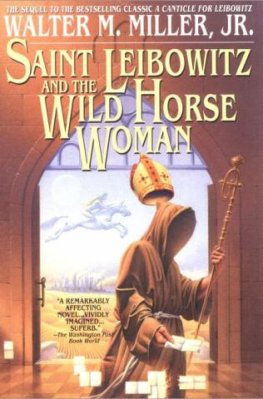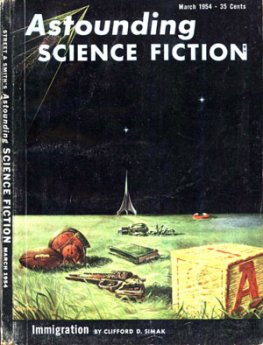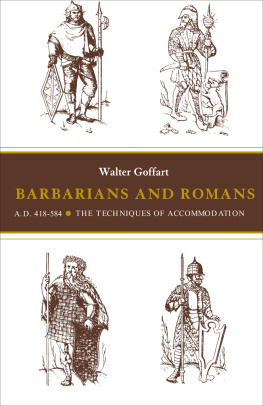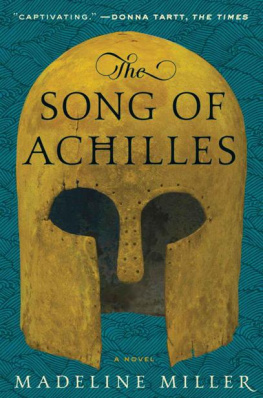Walter M. Miller, Jr.
SAINT LEIBOWITZ AND THE WILD HORSE WOMAN
For David, and all those
who sailed against the Apocalypse
The estate of Walter M. Miller, Jr.,
would like to thank Terry Bisson
for his editorial contribution to
Saint Leibowitz and the Wild Horse Woman.
The fictional Rule of Saint Leibowitz is an adaptation of the Benedictine Rule to life in the Southwest Desert after the collapse of the Great Civilization, but it is true that the fictional monks of Leibowitz Abbey do not always conform to it as perfectly as did the monks of St. Benedict.
Permission was kindly given by the Liturgical Press, Collegeville Minnesota, to quote from the Leonard J. Doyle translation of St. Benedicts Rule for Monasteries, Copyright 1948, by The Order of Saint Benedict.
Listen, my son, to your masters precepts,
and incline the ear of your heart.The
First Sentence of The Rule.
Whoever you are, therefore, who are
hastening to the heavenly homeland, fulfill
with the help of Christ this minimum Rule
which we have written for beginners; and
then at length under Gods protection, you
will attain to the loftier heights of doctrine
and virtue which we have mentioned
above.The Last Sentence of The Rule.
Between these two lines, written about
529 a.d. in a dark age, is Saint Benedicts
homely prescription for a way of monastic
life that has prevailed even in the shadow of
the Magna Civitas.
AS HE SAT SHIVERING IN THE GLOOMY CORRIDOR outside the meeting hall and waited for the tribunal to finish deciding his punishment, Brother Blacktooth St. George, A.O.L., remembered the time his boss uncle had taken him to see the Wild Horse Woman at a Plains Nomad tribal ceremony, and how Deacon (Half-Breed) Brownpony, who was on a diplomatic mission to the Plains at the time, had tried to exorcise her priests with holy water and drive her spirit from the council lodge. There had been a riot, and an assault on the person of the young deacon, not yet a cardinal, whose shaman (witch doctor) attackers had been summarily executed by the newly baptized Nomad sharf. Blacktooth was seven at the time, and had not seen the Woman then, but his boss uncle insisted that she had been there in the smoke of the fire until the trouble began. He believed his boss uncle, as he might not have believed his father. Later, before he ran away from home, he had seen her twice, once by day riding bareback and naked along the crest of a ridge, and once by dim firelight when she prowled as the Night Hag through the darkness outside the settlement enclosure. He definitely remembered seeing her. Now his ties to Christianity demanded that he remember them as childish hallucinations. One of the less plausible accusations against him was that he had confused her with the Mother of God.
The tribunal was taking its time. There was no clock in the hall, but at least an hour had passed since Blacktooth had testified in his own defense and been excused from the meeting hall, which was really the abbeys refectory. He tried not to speculate about the cause of the delay, or the meaning of the fact that pure chance had cast that deacon, now Cardinal (Red Deacon) Brownpony, in the role of amicus curiae at the hearing. The cardinal had come to the monastery from the Holy See only a week ago, and it was well known, but most certainly not announced, that his purpose in being here was to discuss with the Abbot Cardinal Jarad the papal election (the third in four years) which would be called soon after the present Pope finished dying.
Blacktooth could not decide whether the eminent Half-Breeds participation in the trial was favorable or unfavorable to his cause. As he remembered the night of the exorcism, he also remembered that in those days Brownpony had not been friendly to the Plains Nomads, either the wild or the tamed. The cardinal had been raised by sisters in the territory conquered by Texark. It had been told to him that his mother, a Nomad, had been raped by a Texark cavalryman, then had abandoned her baby to the sisters. But in recent years, the cardinal had learned to speak the Nomad tongue, and spent much time and effort forging an alliance between the wild people of the Plains and the exiled papacy in its Rocky Mountain refuge at Valana. Blacktooth himself was of pure Nomad blood, although his late parents had been displaced to the farming settlements. His mother owned no mares, and thus he had no status whatever among the wild tribes. His ethnic background had been no handicap during his life as a monk; the brethren were tolerant to a fault, except in matters of faith. But in the so-called civilized world outside, being a Nomad would be hazardous unless he lived on the Plains.
He heard raised voices from the refectory, but could not make out words. One way or another, it was all over for him but the final break, and that was proving to be the hardest thing of all.
A few paces from the bench where he was supposed to wait was a shallow alcove in the corridor wall, and within it stood a statue of Saint Leibowitz. Brother Blacktooth left the bench and went there to pray, thus disobeying the last command given to him: Sit there, stay there. Breaking his vow of obedience was getting to be a habit. Even a dog will sit and stay, his devil reminded him.
Sancte Isaac Eduarde, ora pro me!
The kneeling rail was too close to the image for him to look up at the saints face, so he prayed to the saints bare feet, which stood on a pile of fagots. Anyway, by now he knew the wrinkled old countenance by heart.
He remembered when he first came to the abbey, the abbot of that time, Dom Gido Graneden, had already ordered the statue removed from his office, its traditional place of repose, to the corridor here where it now stood. Granedens predecessor had committed the sacrilege of having the fine old wood carving painted in living color, and Graneden, who loved it in its original condition, could neither bear to look at it, with its painted simper and impossibly upturned irises, nor put up with the smell and noise of having its restoration done in situ. Blacktooth had never seen the full paint job, for upon his arrival the head and shoulders of a man of wood emerged from what appeared to be the chest of a plaster saint. A small area at a time was being treated with a phosphate compound concocted by Brothers Pharmacist and Janitor. As soon as the paint began to blister, they painstakingly scraped it clean, trying to avoid any abrasion of the wood. The process was very slow, and he had lived a year at the abbey before the restoration was complete; by that time, a filing cabinet occupied its space in the abbots office, so here it still stood.
The restoration was less than complete even now, at least in the sight of those who remembered its original condition. Occasionally Brother Carpenter stopped to frown disapprovingly at it, then to work on the creases around the eyes with a dental pick, or caress between the fingers with fine sandpaper. He worried about what the paint remover might have done to the wood, so he frequently rubbed it with oil and lovingly polished it. The carving had been done nearly six centuries ago by a sculptor named Fingo, to whom the Beatus Leibowitznot yet canonizedhad appeared in a vision. A close resemblance between the statue and a death mask which Fingo had never seen was used as an argument for his canonization, because it seemed to confirm the reality of Fingos vision.
Saint Leibowitz was Blacktooths favorite saint, after the Holy Virgin, but now it was time to go. He crossed himself, arose, and returned doglike to the bench to sit and stay. No one had seen him at prayer except his devil, who called him a hypocrite.












